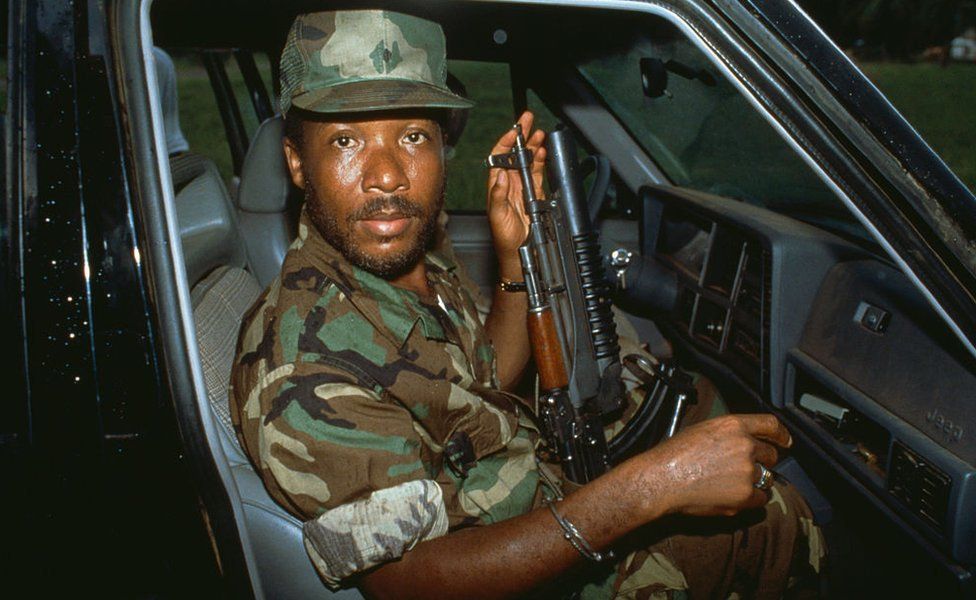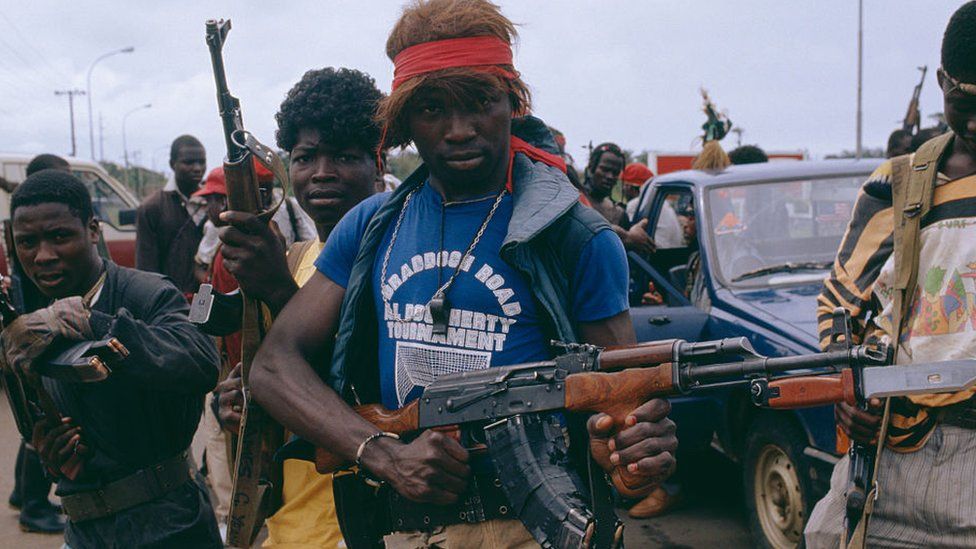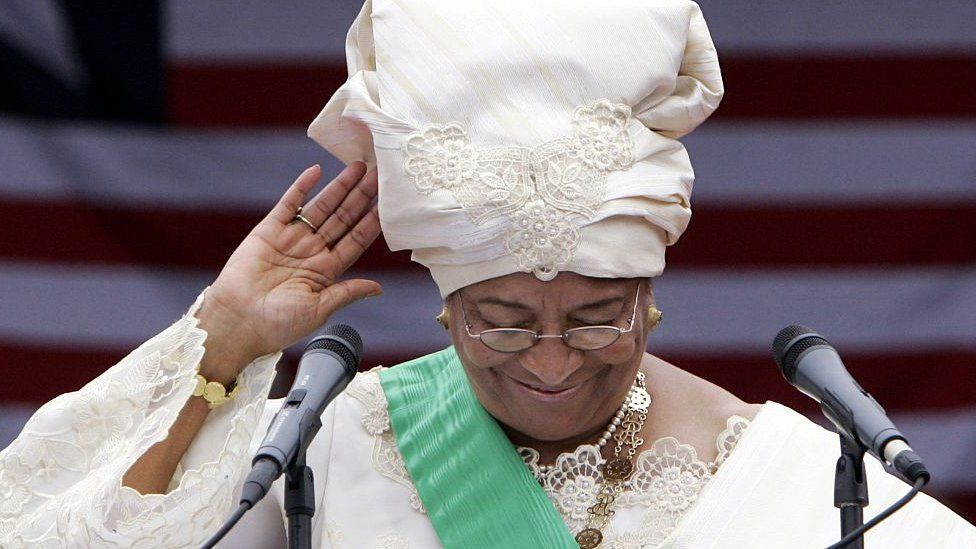African journalist who worked for 30 years, reported on fall of Monrovia several times, retires
In our series of letters from African writers, retiring journalist Jonathan Paye-Layleh reflects on his 30-year career covering the tumultuous events in his home country, Liberia.

I am glad I managed to stay alive to pen these words.
Over the last three decades, colleagues have died while doing their job and I have found my life threatened, especially when covering Liberia's conflicts.
But I survived.
I was in Gbarnga - the stronghold of then-rebel leader Charles Taylor, whose forces controlled most of Liberia except the capital, Monrovia.
Liberians had become addicted to the broadcast following Taylor's interviews with its editor at the time, Robin White. It was required listening wherever you were.
And it was almost an obligation for people in Gbarnga - where a local station had taken to relaying the programme.
At 17:00 GMT residents were glued to their radios, not only to hear about the fighting elsewhere in the country, but also to get an idea of what regional leaders were doing to end the war.
Then Taylor established his own Radio Liberia that broadcast on shortwave and it too relayed the BBC's flagship radio programme for listeners on the continent.

I met one of Focus on Africa's senior producers, Josephine Hazeley, when she visited Gbarnga on a reporting trip and she agreed to the idea that I start sending despatches from the town.
But getting information out was hard. Not least because of the lack of reliable phone lines and, of course, there was no internet in those days.
Instead, I had to rely on the post, hoping that international aid workers would take my work to Monrovia and then send it on.
These were written dispatches that were read in the studio in London. This was how the vast majority of reporters on the continent got their work onto the radio at the time.
And so even though hot news was breaking around me almost every day, I focused strictly on gathering and posting stories that would still be useful even if they took months to reach the production floor at Bush House in London.
My first report from Gbarnga was on a currency crisis.
The government in Monrovia had said the notes in circulation were no longer legal tender. As a result traders in the markets in rebel areas began rejecting the old, shabby and mutilated cash.
The government's move was intended to weaken Taylor, but he was not forced into submission.
As I had no idea when my pieces would be used, I always walked around with a radio pressed to my ear at broadcast time. Then one day at 17:40 GMT I heard the announcer struggle to pronounce the name Gbarnga.
That was my piece being read. To say I was excited was an understatement.
Reaction to my debut story was mixed. Some in the Taylor hierarchy felt the report was an attempt to weaken their position, but others in Gbarnga were pleased that at least there was a BBC correspondent reflecting what they were going through.

I was formally introduced to Taylor in September 1994, a year after I started reporting.
I expected Taylor to be a bit uncomfortable with me because a lot of my reports were about harassment and looting by his forces.
Maybe he was pretending, but dressed in full military uniform, Taylor instead put on a smile and said: "Feel free to do your work, but make sure you try to get our side of the story always. Tell the BBC guys we're not bothering you here."
I nodded in relief, even though I didn't feel entirely reassured.
Reporting on the wars themselves was very challenging.
The fighters were not trained soldiers and knew nothing about the rights of aid workers and journalists.
They didn't care about international conventions guiding military hostilities. They were poorly trained, given guns and told to loot to survive and kill to conquer territory.
I was close to death many times.
As I was reporting from Taylor-controlled areas, I was a target for those fighting to end his military dominance.
In Tieni, a town close to the border with Sierra Leone, I was with a group of reporters working under the protection of peacekeepers. Rebels controlling the town were uneasy seeing me.
One of them ran into the group holding a bayonet and was just about to stab me from behind when a colleague, an Associated Press photographer, yelled to alert me and scare the fighter away.
Even in the Taylor-controlled area where I lived, a notorious rebel commander warned me in the central highway town of Totota that he would kill me if I mentioned his name in any of my reports, which were largely about looting and pillaging by Taylor's fighters.
Overall an estimated 250,000 people - around 8% of the population at the time - died in the conflicts from 1989 to 1997 and 1999 to 2003.
At one point I was offered an opportunity by a Western embassy to be evacuated. But I was reluctant to leave as I was committed to telling the Liberian story until the end of the fighting.
And throughout the last 30 years I have stayed put.
How come other countries have emerged from the ashes and made massive progress but my country has not?"
BBC Liberia reporter 1993-2023

I returned to Monrovia when Taylor joined an interim government in 1995 - he became president two years later. But the fighting resumed in 1999 and only came to an end through the intervention of a regional force and Taylor's exile to Nigeria in 2003.
Though we have had peace for two decades now, I sit and wonder how come other countries that have gone through worse wars have emerged from the ashes and have made massive progress but my country has not.
Non-Liberians in the business and diplomatic communities say the primary reason for Liberia's stagnation is the failure of successive governments to take economic crimes seriously and hold people accountable for looting the national coffers.
And no-one has been prosecuted for their role in the conflicts.
I reported on the reconciliation commission but its recommendations have not been acted upon and people named as having committed atrocities remain elected politicians.

Aside from the conflicts, I also covered the impact of the West Africa Ebola outbreak of 2014-16 that killed 4,800 people in Liberia - more than in any other country.
It exposed the weakness of the health sector more than a decade after the war ended.
As during the fighting, I tried to cover Ebola bravely, but I was frightened by warnings that we were faced with "an enemy we don't see".
When I phoned up a frontline doctor requesting an Ebola test because I was feeling feverish, he asked me a few questions on the phone and concluded I was simply suffering from "fear".
He was correct.
But there have been happier milestones which I have witnessed, not least the election of one of the continent's few female presidents - Ellen Johnson Sirleaf - who stepped down in 2018 after 12 years in office.
Even though in terms of infrastructure development, Liberia has not attained much, I am pleased that the peace we fought so hard to achieve holds.
Monrovia traffic jams are nothing to celebrate but at least this suggests a city that is alive, where the people want to get on. It's not the ghost town yearning for people's presence as during the civil war.
Yet, whereas a line in our national anthem assures "this glorious land of liberty shall long be ours" there is a feeling that we are not taking the lead in the economy.
The big businesses are foreign-owned, we rely on imported rice for our staple food, there are no Liberian engineers on the roads and we rely on Chinese expertise.
We don't yet seem to have learned that we need to take control of our own destiny.
Source: BBC













